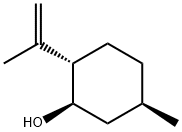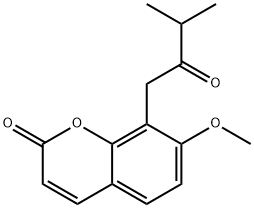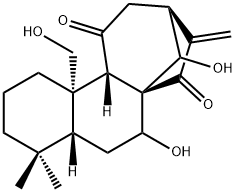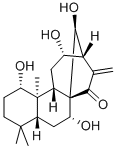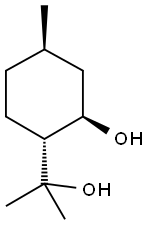BD0588953
Isopulegol , 98% , 89-79-2
Synonym(s):
(1R,2S,5R)-2-Isopropenyl-5-methylcyclohexanol;(1R,3R,4S)-p-Menth-8-en-3-ol
CAS NO.:89-79-2
Empirical Formula: C10H18O
Molecular Weight: 154.25
MDL number: MFCD00134655
EINECS: 201-940-6
| Pack Size | Price | Stock | Quantity |
| 1g | RMB24.00 | In Stock |
|
| 5g | RMB28.80 | In Stock |
|
| 25g | RMB59.20 | In Stock |
|
| 100g | RMB188.80 | In Stock |
|
| 500g | RMB780.00 | In Stock |
|
| others | Enquire |
Update time: 2022-07-08
PRODUCT Properties
| Melting point: | 78°C |
| Boiling point: | 212 °C(lit.) |
| Density | 0.912 g/mL at 25 °C(lit.) |
| vapor pressure | 13.97Pa at 20℃ |
| FEMA | 2962 | ISOPULEGOL |
| refractive index | n |
| Flash point: | 195 °F |
| storage temp. | -20°C |
| solubility | Chloroform (Slightly), Methanol (Slightly) |
| pka | 15.11±0.60(Predicted) |
| form | Liquid |
| color | Colourless |
| Odor | at 10.00 % in dipropylene glycol. minty cooling medicinal woody |
| Odor Type | minty |
| biological source | synthetic |
| optical activity | [α]20/D 22°, neat |
| Water Solubility | 3g/L at 21.9℃ |
| JECFA Number | 755 |
| BRN | 1906573 |
| Stability: | Light sensitive |
| InChIKey | ZYTMANIQRDEHIO-KXUCPTDWSA-N |
| LogP | 2.4 at 23℃ |
| CAS DataBase Reference | 89-79-2(CAS DataBase Reference) |
| EPA Substance Registry System | Isopulegol (89-79-2) |
Description and Uses
Synthesis: Several stereoisomers are possible; only l-isopulegol and d-α-isopulegol have been isolated from mixtures of alcohols obtained by cyclization of d-citronellal.
isopulegol is used in perfume compositions as a "lift" to Rose notes, Geranium notes, Reseda and Oriental types, various floral fragrances, including Tuberose, etc. It is also used in flavor compositions in concentrations equal to 5 to 30 ppm in the finished product. The application is mainly in the minty types and in a few Berry flavor types.
Safety
| Symbol(GHS) |  GHS07 |
| Signal word | Warning |
| Hazard statements | H302-H315-H319-H335 |
| Precautionary statements | P261-P264-P270-P301+P312-P302+P352-P305+P351+P338 |
| Hazard Codes | Xn |
| Risk Statements | 22-36/37/38 |
| Safety Statements | 26-36/37/39 |
| RIDADR | NA 1993 / PGIII |
| WGK Germany | 2 |
| F | 10-23 |
| Toxicity | The acute oral LD50 in rats was reported as 1.03 ± 0.10 ml/kg and the acute dermal LD50 in rabbits as approximately 3 ml/kg |

